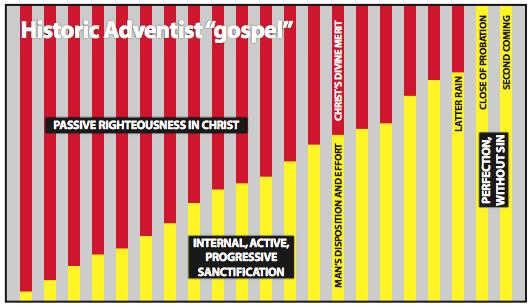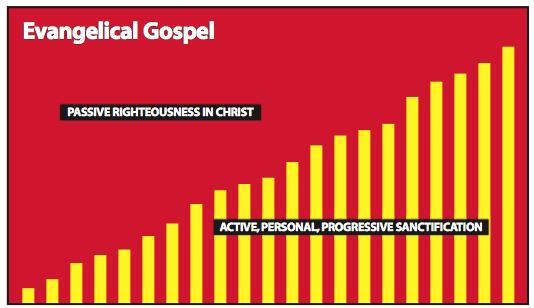 |
|
HOME | PROCLAMATION! MAGAZINE | BLOG SITE | DEVOTIONALS | STUDIES | LETTERS | ABOUT US | RELATED WEBSITES |
|
HOME / PROCLAMATION! MAGAZINE / 2011 / JANUARY FEBRUARY MARCH / PROGRESSIVE SANCTIFICATION
DALE RATZLAFF
Sanctification as set apart
In the Old Testament, as well as in the New, there are many examples of people, places and things being set apart by God. God chose Israel and said, "I have set you apart from the people to be mine."1
"The sons of Amram were Aaron and Moses. And Aaron was set apart to sanctify him as most holy, he and his sons forever, to burn incense before the LORD, to minister to Him and to bless in His name forever" (1 Chron. 23:13). This setting apart did not make Aaron or his sons personally holy. Aaron, in fact, made the golden calf and caused Israel to sin.2 Rather, they were set apart for a specific duty.
"And while they were ministering to the Lord and fasting, the Holy Spirit said, 'Set apart for Me Barnabas and Saul for the work to which I have called them'" (Acts 13:2).
Sanctification as passive, external righteousness
When addressing the church in Corinth, which was full of immature Christians who had all kinds of problems—factions, immorality, lawsuits, perversion of the Lord's Supper, misuse of spiritual gifts, and more, Paul writes, "To the church of God which is at Corinth, to those who have been sanctified in Christ Jesus, saints by calling" (1 Cor. 1: 2). In Greek, "have been sanctified" is a perfect passive which means they were sanctified in an instant of time, but the results of that sanctification continue. The passive voice means it was not their personal effort by which they were sanctified. Rather, as the text states, they were sanctified "in Christ Jesus". It was His doing, not theirs. We find the same meaning in Hebrews 10:9, 10: "then He said, Behold, I have come to do Thy will. He takes away the first in order to establish the second. By this will we have been sanctified [another perfect passive] through the offering of the body of Jesus Christ once for all time." Here "sanctification" denotes being set apart by God because we have been made righteous by the offering of the body of Jesus Christ, once for all time. This is external, passive righteousness. It is the very righteousness of God. For all practical purposes, this verse describes the same righteousness as justification by faith but includes the additional idea of being set apart by God for His use.

Sanctification as active, progressive, internal righteousness—being made holy.
"For by these He has granted to us His precious and magnificent promises, so that by them you may become partakers of the divine nature, having escaped the corruption that is in the world by lust. Now for this very reason also, applying all diligence, in your faith supply moral excellence, and in your moral excellence, knowledge, and in your knowledge, self-control, and in your self-control, perseverance, and in your perseverance, godliness, and in your godliness, brotherly kindness, and in your brotherly kindness, love. For if these qualities are yours and are increasing, they render you neither useless nor unfruitful in the true knowledge of our Lord Jesus Christ" (2 Pet. 1:4-8).
This is a very insightful verse. It resembles Paul's description of the fruit of the Spirit in Galatians 5, and it gives us additional insight on how these personal qualities are developed. Peter states that we are to develop these personal qualities of holiness as a result of focusing on "His precious and magnificent promises."
We know that we, in ourselves, are not as good as we ought to be. We want to live more like Christ. We accept the fact that we are justified by faith, but we want to see more of Christ's righteousness worked out in our lives. And this desire is good. But how do we do this?
Our former teaching on sanctification
Those of us who have come from Adventist backgrounds must come to grips with the function of the law in sanctification. We can accept the fact that we are justified by faith alone, but we were taught that justification was only half the story. We were also taught that we must advance in sanctification. And we heartily agree that obedience to God is taught throughout the Bible. Those who love God will keep His commandments. Jesus tells us over and over again what His commandments are: we are to love the Lord with all our heart, mind and soul, and our neighbor as ourselves.3 Yet when we speak of advancing in sanctification things get a little fuzzy. Every life has its ups and downs, not only for us today, but the characters presented in Scripture were no different. Bible history presents men and women as fallible sinners like us. Noah got drunk with wine, Abraham and Sarah lied, Moses lost his temper, and David committed adultery and murder—and the list could go on. In the New Testament we find the disciples—after walking with Christ for three years—bickering about who would be the greatest. Peter denied Christ and later compromised the gospel when the party of James arrived in a gentile meeting.
So how does progressive sanctification fit into all this? Is it the tendency of my life that counts? What if I am killed in an auto accident when my "arrow of sanctification" is headed in the wrong direction? Does a lack of sanctification undermine my right standing with God? My prayer is that God's Word will bring clarity here, for it is greatly needed.
As one studies the book of Galatians, it becomes evident that the main problem Paul confronted was not believers living in open, personal sin. Rather, they were being seduced by a perversion of the gospel. Apparently false teachers were telling the Galatian believers that while justification by faith was good, they also needed "personal righteousness" in addition to "faith righteousness" and were directing them back to the law.
Today when sanctification is mentioned, especially in Adventism, it usually refers to the progressive idea of personal righteousness.4 Those who read the writings of Ellen White are often directed back to the law to gain sanctification. Following are several quotations from Ellen White on sanctification and obedience to the law. As you read these see if you can discern how one is sanctified and also, why personal righteousness is needed. All emphases are mine.
"Obedience to all the commandments of God is the only true sign of sanctification."5
"We must go among them [southern people] and show them how to honor and obey God's law, in order that they may be prepared to have a part in the new earth."6
"Every sin will be put away from us because it is an offense to God, and we will bring ourselves into harmony with God."7
"Those who are truly sanctified by a knowledge of God, will render perfect obedience to God's requirements."8
"They will be sanctified and glorified through obedience to the commandments of God, wrought by divine power, through the faith of the Son of God."9
"Bible sanctification is a conformity to the will of God, attained by rendering obedience to his law, through faith in his Son."10
"Obedience to the law of God is sanctification."11
The above quotes show Mrs. White's teaching that obedience to God's law, empowered by faith in Christ, is necessary for sanctification. The "how" is obedience to the law. The "why" is to meet God's requirements, to bring ourselves into harmony with God, and to be prepared to have a part in the new earth. Although she says this righteousness is accomplished by faith in Christ and by the power of the Holy Spirit, it is nevertheless our own active, internal, personal righteousness. Following is another quote that was often used to explain sanctification and personal righteousness:
"When it is in the heart to obey God, when efforts are put forth to this end, Jesus accepts this disposition and effort as man's best service, and he makes up for the deficiency with his own divine merit"12 (emphasis mine).
When I was a student in Adventism the above quote was often used with the diagram below.

The red lines represent the passive righteousness that is in Christ, imputed to us by faith alone. The yellow lines represent internal, active, progressive sanctification. The red lines above the yellow lines represent the "deficiency" in our "disposition" and "effort". In other words, we are fitted for heaven partly by our active, personal obedience to the law by faith in Christ and partly by the righteousness that is imputed to us—Christ's own divine merit.
You will note that near the right of the chart, the yellow line reaches clear to the top. Notice "the close of probation".13 The yellow lines without red above represents the time when the saints have to live in the sight of God without an intercessor.
"In that fearful time, after the close of Jesus' mediation, the saints were living in the sight of a holy God without an intercessor. Every case was decided, every jewel numbered. Jesus tarried a moment in the outer apartment of the heavenly sanctuary, and the sins which had been confessed while He was in the most holy place were placed upon Satan, the originator of sin, who must suffer their punishment."14
Over the years, this teaching has been modified. Rather than insist that the last generation reach perfection (although some still teach they must and see this lack as the reason Christ has not yet come),15 it was said that God looks at the tenor of the life. If we are growing in Christ and our "sanctification arrow" is moving upward, then God will make up for the "deficiency". If our "sanctification arrow" is on a steep dive toward the bottom of the chart, no one knows the final outcome. But there would certainly be no assurance of salvation in that case, and if one expressed assurance, they would be viewed as presumptuous.
In commenting upon 2 Peter 1:4-8 mentioned above, Ellen White states: "We are saved by climbing round after round, mounting step after step, to the height of Christ's ideal for us. Thus He is made unto us wisdom, and righteousness, and sanctification, and redemption."16 Many of us remember the song we used to sing, "Every round goes higher, higher…"
In summary, the historic Adventist teaching on sanctification includes the following.
- Sanctification usually refers to personal, active, progressive righteousness.
- Obedience to the law aided by faith in Christ with the power of the Holy Spirit is the means by which one becomes sanctified.
- The purpose of one's sanctification is to become progressively more holy, fitted for the new earth.
- One meets the righteous requirement of God by having a disposition (desire) to obey God and makes his/her best effort to this end. Jesus then accepts this disposition and effort as his/her best service and makes up for the deficiency with His own divine merit.
Thus, we are saved partly by Christ's righteousness that is imparted (active, personal righteousness) to us by obeying the law through faith in Christ and partly by Christ's imputed (passive) righteousness (Christ's divine merit).17
This Adventist view of sanctification is very much like the false teaching threatening the Galatians. They listened to Paul preach the gospel, and they responded to that gospel. Then, after Paul left the area, false teachers came in and added to the gospel by requiring personal righteousness through observance of the law. To this heresy Paul states: "I do not nullify the grace of God, for if righteousness comes through the Law, then Christ died needlessly" (Gal. 2:21).
"You foolish Galatians, who has bewitched you, before whose eyes Jesus Christ was publicly portrayed as crucified? [This is the gospel message.] This is the only thing I want to find out from you: did you receive the Spirit by the works of the Law, or by hearing with faith [acceptance of the gospel]? Are you so foolish? Having begun by the Spirit, are you now being perfected by the flesh?" (Gal. 3:2-3).
The biblical way to achieve active, personal righteousness
First, we must be born again, justified by faith, saved by grace!
Any attempt to live a righteous life in obedience to the Ten Commandments without being born again is fruitless for righteousness and/or sanctification. As Martin Luther pointed out in his introduction to his commentary on Galatians, obedience to the Ten Commandments, as well as to the ritual laws, "may be wrought by us either by our natural strength, or else by the gift of God." Obedience to God's moral principles always has many advantages, even for those who are not Christian. But this legal obedience is not a substitute for genuine sanctification. One must first be freed from sin, born again in spirit, and set apart for God's service before progressive sanctification even starts.
Paul, throughout the epistles, first lays the foundation of acceptance by God's grace based solely on faith in Christ. Then, and only then, does he admonish believers in Christian living. Christian living flows from being saved; it does not qualify one for salvation.
Sanctification is not a function of the law
In Romans 7, Paul shows how the law is actually against us developing personal righteousness. "Therefore, my brethren, you also were made to die to the Law through the body of Christ, so that you might be joined to another, to Him who was raised from the dead, in order that we might bear fruit for God. For while we were in the flesh, the sinful passions, which were aroused by the Law, were at work in the members of our body to bear fruit for death. But now we have been released from the Law, having died to that by which we were bound, so that we serve in newness of the Spirit and not in oldness of the letter" (Rom. 7:4-6).
This is not an isolated text. The truth of this statement is repeated over and over again.18 By saying that sanctification is not the function of the law, many will immediately accuse us of wanting to live in sin. No, never! Note carefully the following verse:
"Therefore there is now no condemnation for those who are in Christ Jesus [because we have been declared righteous]. For the law of the Spirit of life in Christ Jesus has set you free from the law of sin and of death. For what the Law could not do, weak as it was through the flesh, God did: sending His own Son in the likeness of sinful flesh and as an offering for sin, He condemned sin in the flesh, so that the requirement of the Law might be fulfilled in us, who do not walk according to the flesh but according to the Spirit" (Rom. 8:1-4).
Note that "the requirement of the law" is not fulfilled in us until after we have been set free from the law! In other words, we achieve obedience to God's moral principles represented in the law, not by focusing on the law, but by looking away from the law and focusing on our standing in Christ. At that point we have the very righteousness of God imputed to us and then the Holy Spirit speaks to our born-again spirit and begins to develop His fruit in our lives. As Paul pointed out in Romans 7, the law actually arouses our sinful passions that lead to death. The law is against us when it comes to achieving personal righteousness.
Sanctification is the work of the Holy Spirit.
"But if you are led by the Spirit, you are not under the Law" (Gal. 5:18). Nothing could be more direct and clear. Paul goes on in Galatians to show what the fruit of the Spirit is. "But the fruit of the Spirit is love, joy, peace, patience, kindness, goodness, faithfulness, gentleness, self-control; against such things there is no law" (Gal. 5:22-23). This is real, active progressive sanctification, and it is the work of the Spirit in every aspect of our lives.
The same principle is described in 2 Corinthians 3. The thrust of this chapter is that the Spirit in the new covenant not only takes the place of the law in the old covenant, but He also gives true transformation to life.
"But their minds were hardened; for until this very day at the reading of the old covenant the same veil remains unlifted, because it is removed in Christ. But to this day whenever Moses is read, a veil lies over their heart; but whenever a man turns to the Lord, the veil is taken away. Now the Lord is the Spirit; and where the Spirit of the Lord is, there is liberty. But we all, with unveiled face beholding as in a mirror the glory of the Lord, are being transformed into the same image from glory to glory, just as from the Lord, the Spirit" (2 Cor. 3:14-18).
It is not the law that brings true transformation; transformation only comes when we set aside the veil of the law so that we can see the radiant glory of the Lord who is the Spirit.
Progressive sanctification is not meritorious
This is vital to understand. One cannot be free from the law and devoted to Christ until this truth is firmly planted and nurtured in the soil of the soul. As long as one is depending, even in the smallest amount, on one's "disposition" and "effort", there is no assurance, no freedom, and no liberty that is so often mentioned in the epistles.19 We cannot be married to the law and married to Christ at the same time. That is spiritual adultery.20 Until one fully accepts the passive sanctification mentioned above in Hebrews 10:9, 10, there can be no real progressive sanctification.
The following parable of Jesus teaches that there is no salvation merit in our obedience. In Luke 17, Jesus had just told His disciples that if they had faith like a mustard seed, they could say to a mulberry tree, "Be uprooted and be planted in the sea"—and it would obey them. Mulberry trees have an aggressive root system, and we can envision the disciples imagining what power their faith will bring them! Perhaps they were envisioning overcoming the Romans as they helped Christ set up His earthly kingdom. However, immediately after Jesus' statement on "mulberry-tree-moving faith", Luke records Jesus saying,
"But which of you, having a slave plowing or tending sheep, will say to him when he has come in from the field, 'Come immediately and sit down to eat'? But will he not say to him, 'Prepare something for me to eat, and properly clothe yourself and serve me until I have eaten and drunk; and afterward you will eat and drink'? He does not thank the slave because he did the things which were commanded, does he? So you too, when you do all the things which are commanded you, say, 'We are unworthy slaves; we have done only that which we ought to have done'" (Lk. 17:7-10).
Jesus is showing that obedience to his commands is not meritorious. Earlier we showed the chart on justification/sanctification that many of us were taught. Compare that with what I believe to be the biblical model
 .
.
The red represents the passive righteousness of justification, and the yellow lines represent active, personal, progressive sanctification. Note that the believer never relies at all on progressive sanctification for his standing with God; from the beginning of our Christian walk to the very end we rely always and only on the external righteousness, the very righteousness of God received by grace through faith in Christ Jesus!
There are two underlying questions that we have not yet fully answered that must be brought into sharp focus: (1) how do we achieve more personal, active righteousness, and (2) why do we want more personal, active righteousness? How we answer these two questions will impact our relationship with Christ and the focus of our daily lives. We will address these questions in the next issue of Proclamation! †
Endnotes
- Lev. 20:26.
- Ex. 32.
- Mt. 22:37-39; Jn. 13:34; 15:10, 12.
- "But the Bible teaches that sanctification is progressive." Ellen G. White, Spirit of Prophecy, vol. 4, p. 300.
- Ellen G. White, Home Missionary, 1897-07-01.015.
- Ellen G. White, Southern Work, p. 33.
- Ellen G. White, Review & Herald, 1890-06-10.013.
- Ellen G. White, Review & Herald, 1901-09-03.002.
- Ellen G. White, Signs of the Times, 1888-04-13.015.
- Ellen G. White, Spirit of Prophecy, vol. 4, p. 299.
- Ellen, G. White, Signs of the Times, 1890-05-19.003.
- Ellen G. White, Signs of the Times, 1890-06-16.006.
- An Adventist term signifying a point in time, before the second coming of Christ, when the "door of mercy" is closed and no more people can be saved.
- Ellen G. White, Early Writings, p. 280. (See also The Great Controversy, p. 614, Spiritual Gifts, vol. 1, p. 198; Spirit of Prophecy, vol. 4 p. 432).
- "When the fruit is brought forth, immediately he putteth in the sickle, because the harvest is come.' Christ is waiting with longing desire for the manifestation of Himself in His church. When the character of Christ shall be perfectly reproduced in His people, then He will come to claim them as His own. It is the privilege of every Christian not only to look for but to hasten the coming of our Lord Jesus Christ, (2 Peter 3:12, margin). Were all who profess His name bearing fruit to His glory, how quickly the whole world would be sown with the seed of the gospel. Quickly the last great harvest would be ripened, and Christ would come to gather the precious grain." Ellen G. White, Christ Object Lessons, p. 69.
- Ellen G. White, Acts of the Apostles, p. 530.
- This is really the teaching of the Catholic Church. The main difference is this: Adventists achieve their internal, personal righteousness by keeping the law while the Catholics achieve their internal, personal righteousness through the sacraments of the church.
- See Phil. 3:8-10, Gal. 2:19, 21; 3:10-12; 17, 19-25; 4:1-11, 21; 5:11, 13, 18.
- Rom. 8:2, 21; 1 Cor. 9:1; 10:29; Gal. 4:30, 31; 5:1, 13; 1 Pet. 2:16; 1 Cor. 8:9; 2 Cor. 3:17; Gal. 2:4; Jam. 1:25; 2:12.
- See Rom. 7:1-6.
![]()
Copyright 2011 Life Assurance Ministries, Inc., Casa Grande, Arizona, USA. All rights reserved. Revised April 4, 2011. Contact email: proclamation@gmail.com
January February March 2011
VOLUME 12, ISSUE

What if I am killed in an auto accident when my "arrow of sanctification" is headed in the wrong direction? Does a lack of sanctification undermine my right standing with God?
 Dale Ratzlaff is the founder of Life Assurance Ministries, Inc., and owns LAM Publications, LLC. He served as an Adventist pastor for 13 years, seven at Monterey Bay Academy where he taught Bible. He and his wife Carolyn left the Adventist church in 1981 when he realized he could no longer teach the investigative judgment in clear conscience. He has authored Sabbath in Christ, The Cultic Doctrine of Seventh-day Adventists, The Truth About Adventist "Truth", and Truth Led Me Out. These are available through his website, LifeAssuranceMinistries.com. The Ratzlaffs reside in Casa Grande, Arizona.
Dale Ratzlaff is the founder of Life Assurance Ministries, Inc., and owns LAM Publications, LLC. He served as an Adventist pastor for 13 years, seven at Monterey Bay Academy where he taught Bible. He and his wife Carolyn left the Adventist church in 1981 when he realized he could no longer teach the investigative judgment in clear conscience. He has authored Sabbath in Christ, The Cultic Doctrine of Seventh-day Adventists, The Truth About Adventist "Truth", and Truth Led Me Out. These are available through his website, LifeAssuranceMinistries.com. The Ratzlaffs reside in Casa Grande, Arizona.

I started to write this article with some confidence. Then, the more I prayed and studied, the more humbled I have become. Who am I to write on the subject of personal holiness? Why do I even want to write on such a subject? What I thought would be a slam-dunk assignment has turned into a soul-searching journey. Like looking through a zoom lens, the subject has expanded before my eyes. What follows is certainly not the final word on the subject. It is only the "Dick and Jane" version—for those of you old enough to remember that first grade reader.
One problem we discover when we discuss sanctification is a lack of clarity on the meaning of the term. "Sanctification" is used a number of ways in Scripture with differing nuances of meaning, so we need to clarify our definitions.